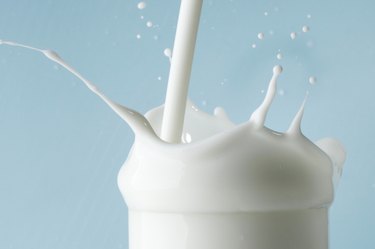
When you're struggling to lose weight, you may scrutinize every aspect of your diet and even wonder if lactose -- the sugar found in milk -- is making you fat. But lactose is no more likely to cause fat accumulation than any other nutrient or food. Excess calories lead to fat gain, not one single nutrient like lactose. If you're gaining weight and unsure of the cause, get advice from either your doctor or a dietitian.
What is Lactose?
Video of the Day
Lactose is a sugar, but it isn't the same as the white stuff in your sugar bowl. Both are simple carbohydrates, but lactose isn't as sweet as table sugar and is found only naturally in milk. Lactose is composed of two molecules: glucose and galactose. During digestion, your body breaks the bond between glucose and galactose. The galactose is then converted to glucose, and both glucose molecules are used for energy by your cells. As a simple sugar, however, lactose gets broken down more quickly than a complex carb such as oatmeal, so lactose may cause a fast rise in blood sugar.
Video of the Day
What Causes Weight Gain?
Eating too much of anything causes weight gain. When you eat more calories than your body burns, those extra calories -- no matter where they come from -- get converted into fat and stored in your fat cells. To put it in perspective: a cup of milk has 80 to 150 calories, depending on fat content, and 48 of those calories -- whether from nonfat or whole milk -- come from lactose. If you drink a lot of milk and it causes you to consume more calories than you need, all of the extra calories from the lactose, fat and protein could turn into fat.
Lactose and Feeling Fat
If you're lactose intolerant, drinking milk may lead to bloating. Lactose requires an enzyme called lactase for digestion, but people with lactose intolerance either lack this enzyme or don't make enough of it. Without lactase, their bodies can't break down the lactose, so it ferments in the intestine, leading to bloating, gas and diarrhea. The uncomfortable symptoms cause the belly to swell, which can make you feel heavy and fat. However, the discomfort is temporary and should not affect the number on the scale.
Dairy, Health and Weight
Dairy makes a healthy addition to any diet and may actually help you lose fat. A 2004 clinical study published in Obesity Research showed that a high-dairy, reduced-calorie diet helped promote weight and fat loss significantly better than a traditional reduced-calorie diet. Adults should get 3 cups of dairy a day. If you're concerned about weight gain, consider the lower-calorie milk options such as nonfat or low-fat milk. And if you're lactose intolerant, use lactose-free milk in your morning cereal or add yogurt to your fruit smoothie to get the health benefits of dairy without the gas and bloating.
- Colorado State University Extension: Sugar and Sweeteners
- National Institute of Diabetes and Digestive and Kidney Diseases: Lactose Intolerance
- University of Illinois: Milk Composition: Lactose
- National Heart, Lung and Blood Institute: What Causes Overweight and Obesity?
- Dairy Council of California: Nutrients in Milk
- Obesity Research: Calcium and Dairy Acceleration of Weight and Fat Loss During Energy Restriction in Obese Adults